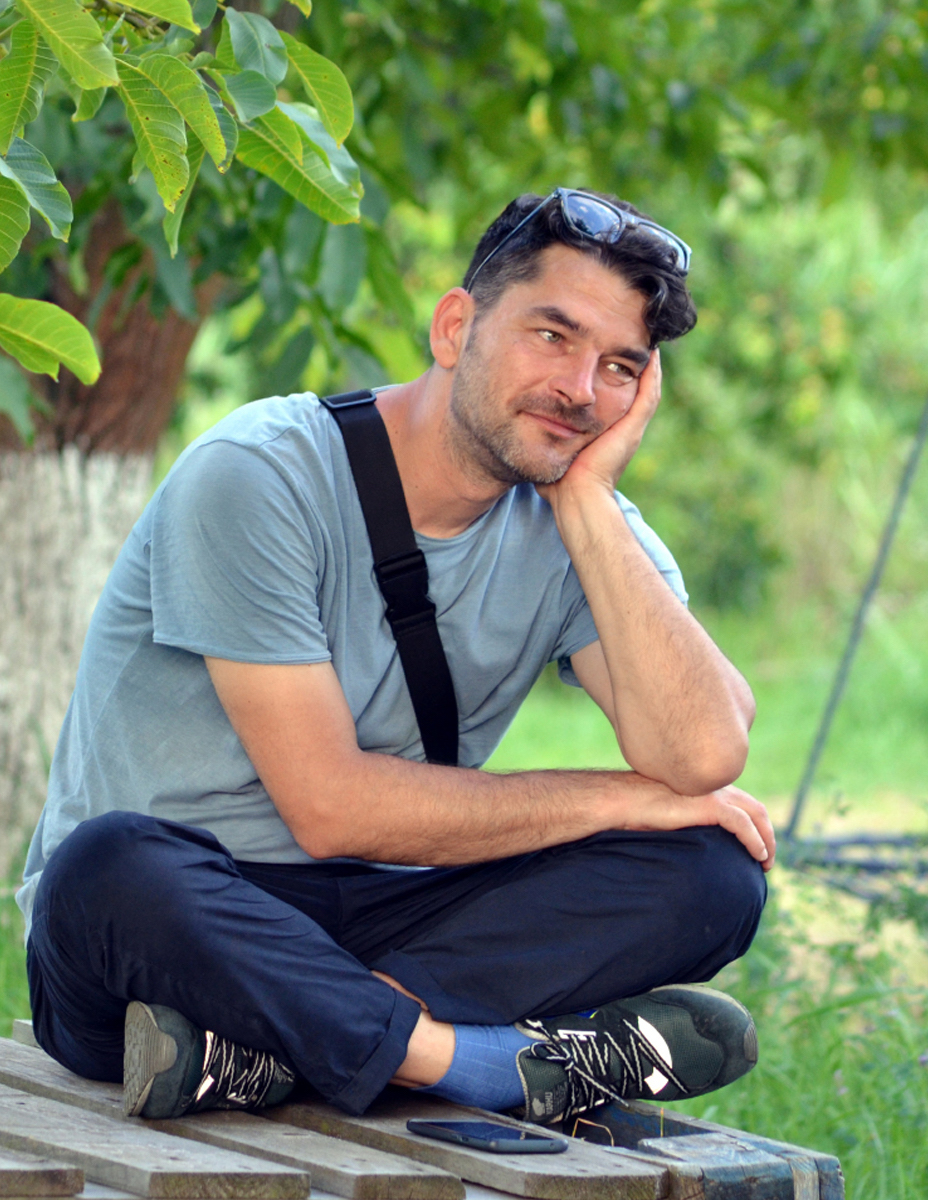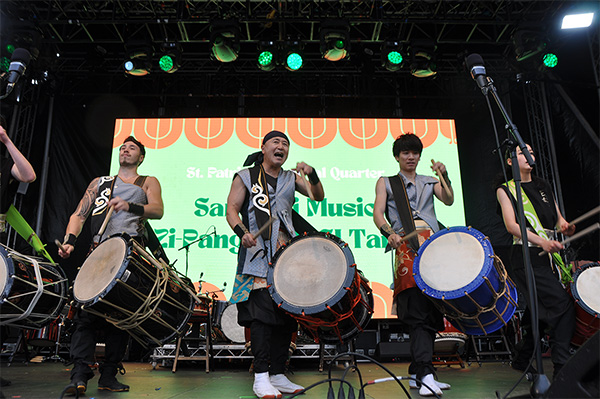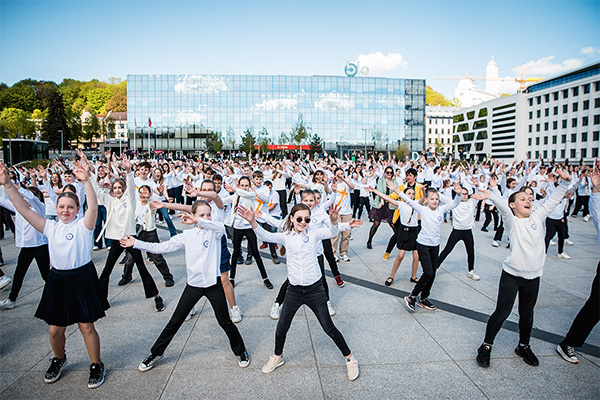Column
Column“uni-form”
“uni-form” is an ongoing video-documentary essay that the young director Akira Kawasaki is making as part of her studies at the Deutsche Film-und Fernseakademie Berlin (DFFB), and whose research proposal was the subject of a public presentation at the art-education conferences Outside the school: Artă – mă. Reintroduction in artistic education #4.
In the preamble, Akira projects for the first time, the short film with a similar theme Obey, Obey, in which she illustrates in an edutainment way, some of the dress codes in public Japanese schools, with an emphasis on the aspects related to the types of hairstyles allowed. It is worth mentioning that it was made entirely on 8mm film, on which the director intervened manually through various types of physical alterations. At the same time, using various cinematic techniques, including stop motion, she managed to convey her passion for color, texture, animation and craft, a good part of the props being made by herself, in a small home studio, along with most of the elements used in the film – from plaster masks to sound illustration.

It is a short self-biographical film, which manages to bring, through caricature and restrained irony, a comfortable distance between us and one of, perhaps, the most disturbing aspects of public education systems in the world (not only in Japan) – the way in which the school becomes an instrument of social uniformity. Practically, an almost ad-literam exemplification of the Foucaultian concept of production of “docile bodies”, a common motif of totalitarian states and modern liberal democracies alike.
In Obey, Obey for example, we learn that in addition to prohibiting “excessive asymmetry” hairstyles or the use of cosmetics, if the hair color deviates from the cultural norm of brunette/dark hair, some Japanese schools require from the parents a “proof of natural hair”, a certification of this hereditary whim that has thus become an anomaly. Taken together, these norms are part from an extensive arsenal of school obligations that Akira Kawasaki set out to detail in a larger documentary entitled “uni-form”, whose central theme is attire, as a form of “representing the virtues of a student”, being some rigid dress codes, reinforced by 風紀検査, or “moral inspection”.
Akira Kawasaki grew up in the US until the age of 10, when she moved back with her parents to her hometown of Fukuoka, where she had to conform and adapt to the rules of a local school with quite a lot of difficulty, as she recalls. Especially the inspections created some humiliating experiences for her:
”I will never forget how at least once a month, the teachers would gather an entire grade (40 students per classroom x 10 homeroom classes) into a hall, have us line up, and check our bodies from head to toe, to see if we are keeping the guidelines. Especially how they would have us girls kneel and stretch our arms out, and the end of our skirts had to touch the ground.”
One of the film’s research directions will be to examine the motivations behind these dress codes, which however are not present in all Japanese schools. Even so, under what circumstances do they occur and who benefits from them? Does the presumption that natural hair must be black and straight have racist connotations? Does repressing any adolescent attraction to age-specific wardrobes lead to an internalization of body shame? Is the school responsible for creating significant cultural patterns such as social apathy and addiction to uniformity? Last but not least, what are the political dimensions of these dress codes against which more and more voices are opposing?
“I don’t blame all of Japan’s societal problems on its educational system but it’s unnecessary to say the schooling has a major impact on society as the experience of having lived through it, is something the vast majority of Japan’s population has in common. So in my view, it is not too farfetched that I make associations such as: the public’s apathy towards politics, patriarchy, misogyny, nationalism, racism, classism, ableism, anti-queerness, the list goes on, starting with the topic of uniforms and rules in Japanese schools as an entry point” says the director.

A final chapter of the film shows us, perhaps, the real winners of these codes of dress and behavior – the corporations, which have turned schoolgirls and their school uniforms into something cute – kawaii (かわいい), to commodify them in the form of film, entertainment and advertising industries icons, reaching the point where, even in schools where there are no dress codes, there are students who purchase these uniforms and wear them voluntarily.
In the context of wider critical discussions about school and pedagogy, the presentation benefited by the presence of a large group of students. We have already gotten used to talk about education in radical and passionate terms, sometimes with sadness and sometimes with hope, but always in the absence of those for whom education is intended. Thus, the presence of a class of students from the Sabin Drăgoi High School of Arts from Arad, who were on a small one-day trip to Timișoara, turned Akira’s presentation into a meaningful discussion, which eventually turned into a group therapy session. Akira Kawasaki’s moving and honest presentation, as well as the real motivations behind this directorial essay project, gave courage to the students of Arad, who began to recount their own humiliations and abuses at the hands of overzealous, obtuse and unemphatic teachers, who teach bureaucratically and disciplined (in turn), some content not appropriate to the current context.
Regarding the documentary, Akira added that “my goal here, is to achieve a film project that could become a framework for people to start a conversation. So I need to take it to the heart. (…) This film should also be about how do we make changes and not just, okay, let’s abide by this rule.”
Obey, Obey is selected to be screened at the Berlinale International Film festival and other dedicated events in the future, so it will have a wide visibility.
Akira Kawasaki’s both projects bring a substantial research input to cultural studies and educational sciences. As the director notes, school is definitely something that unites all of us. School it is a place where we spend a large period of our time and it is to be discussed continuously who are the beneficiaries of education – the students, the society as a whole or a handful of industries. At the same time, we have to ask ourselves how we do education. Akira’s films complement and add to Minitremu’s near future projects, as on one hand we will re-imagine the school format, both physically and symbolically, alongside a group of architects and landscapers. And on the other hand, alongside with some teachers and experts in education, in the frame of a publishing house through which we can translate and print the most current critical pedagogy titles and help to develop suitable educational contents.

It is very difficult to predict what impact such a small organization can have in the context of an entire educational system, but we start from the premise that honest and sincere dialogue on education is important. This dialogue does not only take place in alternative cultural spaces or through the contribution of local, European or Japanese non-governmental organizations (such as Ongoing Collective, Cocoroom or Koganecho Art School), but also takes place within major art events, such as Manifesta 14 or documenta 15. And as we can see, this dialogue continues through several young authors like Akira, who’s film work use this cultural object – the school, to reveal its latent performative functions. It is a fertile area for continuous collaborations on the reformulation of new pedagogies.








